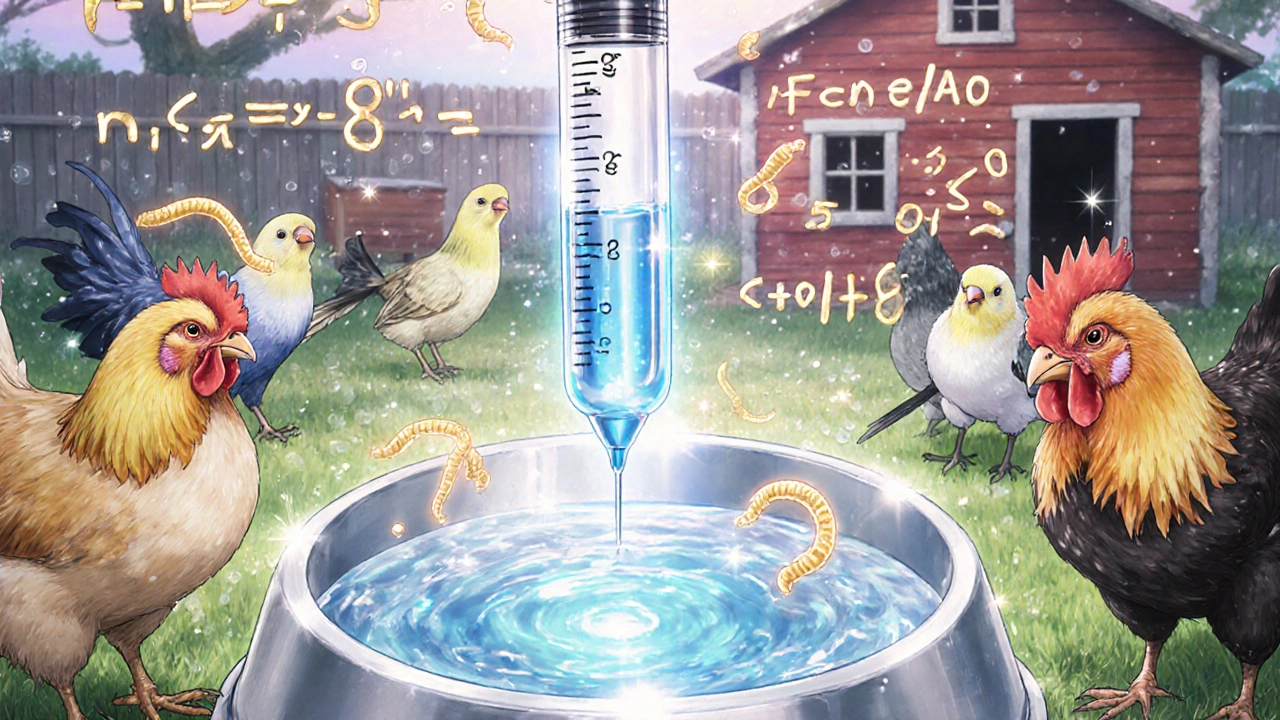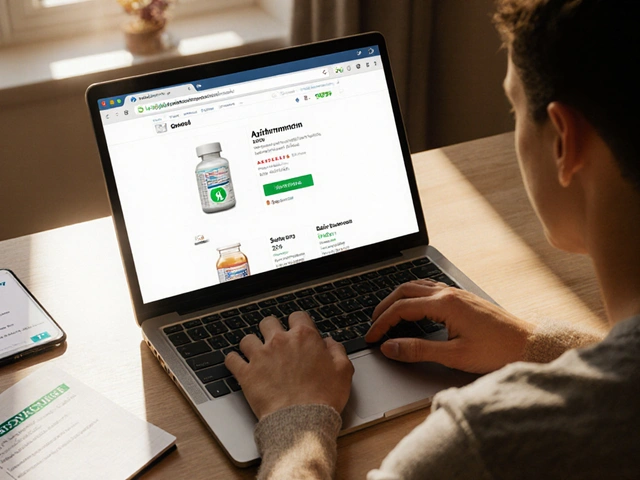Parasites are a silent killer in bird flocks. Many bird owners, whether raising backyard chickens or caring for a beloved parrot, don’t realize their birds are infected until it’s too late. Weight loss, ruffled feathers, diarrhea, and sudden death can all be signs of a hidden worm infestation. Levamisole is one of the few safe, effective dewormers approved for use in birds-but only if used correctly. Wrong dosage, wrong timing, or using the wrong formulation can do more harm than good.
What is levamisole and how does it work in birds?
Levamisole is a synthetic anthelmintic, originally developed for livestock, that works by paralyzing parasitic worms. It targets nematodes-roundworms like Ascaridia galli in chickens or Capillaria in canaries and parrots. Once the worms are paralyzed, they lose their grip on the bird’s intestinal lining and are passed out in the droppings.
Unlike some older dewormers that kill worms slowly and cause toxic reactions, levamisole acts quickly and cleanly. It’s absorbed through the bird’s gut and enters the bloodstream, where it reaches the parasites. The drug doesn’t harm the bird’s cells, making it one of the safer options when dosed properly. It’s been used in poultry since the 1980s and is now common in avian veterinary practice for both commercial and pet birds.
Which birds can be treated with levamisole?
Levamisole is approved and effective for a wide range of birds, including:
- Chickens and other poultry (turkeys, ducks, geese)
- Parrots (African greys, cockatiels, budgies)
- Canaries and finches
- Pigeons and doves
- Exotic birds like toucans and hornbills
It’s not recommended for very young chicks under 2 weeks old or for birds under extreme stress, such as those recovering from surgery or severe illness. Always consult a vet before treating breeding hens or birds that are molting-these are high-risk periods where even safe drugs can cause complications.
Common parasitic infections in birds
Not all worms are the same. Different species affect different birds:
- Ascaridia galli - Large roundworms in chickens. Can grow up to 10 cm long. Causes blockages, poor growth, and sudden death.
- Capillaria spp. - Hairworms that live in the crop and intestines. Common in pet birds. Leads to weight loss and bloody droppings.
- Heterakis gallinarum - Small roundworms. Often found with coccidia. Can carry harmful protozoa.
- Strongyloides spp. - Threadworms in the lungs or intestines. Seen in pigeons and wild birds.
Signs of infection include: reduced appetite, dull plumage, diarrhea with mucus or blood, decreased egg production in hens, and birds sitting hunched with eyes closed. If you see worms in droppings, that’s a clear sign-but many infections show no visible worms at all. Fecal float tests from a vet are the only reliable way to confirm.
How to dose levamisole in birds
Levamisole is sold as a liquid concentrate (usually 10% or 15% solution) or as a powder. For birds, it’s almost always given in water, never as a tablet or injection unless directed by a vet.
The standard dose is 10 mg per kg of body weight. That means:
- A 1 kg chicken needs 10 mg of levamisole
- A 100 g budgie needs 1 mg
- A 2 kg turkey needs 20 mg
Most commercial levamisole solutions are 10% (100 mg/mL). So for a 1 kg bird, you’d need 0.1 mL of solution. That’s tiny-use a syringe without a needle to measure accurately.
Here’s how to mix it:
- Calculate the total amount needed for all birds.
- Dilute the levamisole in clean, chlorine-free water. Use a ratio of 1 mL of 10% solution per 1 liter of water for general flock treatment.
- Offer this as the only water source for 24 hours. Remove all other water sources.
- Do not mix with food or feed. Birds drink more than they eat, so water dosing ensures accurate intake.
- After 24 hours, replace with fresh, clean water.
Never exceed the recommended dose. Overdosing can cause tremors, loss of coordination, or even death. If you’re unsure, start with half the dose and watch for reactions.

When to treat your birds
Timing matters. Don’t treat birds randomly. Here’s a practical schedule:
- Poultry flocks: Treat every 3 to 4 months. Spring and fall are best-before peak laying and before winter stress.
- Pet birds: Treat once a year, unless signs appear. Annual fecal checks are ideal.
- After introducing new birds: Always quarantine and deworm before mixing with your flock.
- After outbreaks: Treat the whole flock, even birds that look healthy.
Don’t treat during molting. Birds use all their energy to grow new feathers. Adding a drug can trigger feather loss or slow regrowth. Also avoid treating during extreme heat or cold-stress reduces drug effectiveness and increases risk of side effects.
What to expect after treatment
Within 24 to 48 hours, you’ll likely see dead worms in the droppings. They look like thin, white threads or small coils. This is normal. Don’t panic.
Some birds may seem lethargic for a day. That’s the body clearing the dead worms. If a bird stops eating, drinks excessively, or shows tremors, contact a vet immediately. These are signs of overdose or reaction.
Recovery is usually quick. Birds should return to normal activity and appetite within 3 days. Egg-laying hens may take a week to resume full production. That’s fine-it’s better than losing birds to worms.
Side effects and safety concerns
Levamisole is safe when used correctly, but it’s not risk-free.
- Overdose: Can cause neurological symptoms-head tilting, stumbling, seizures. Stop treatment and give activated charcoal if available.
- Allergic reactions: Rare, but some birds develop swelling or skin irritation. Discontinue use.
- Drug interactions: Do not use with other dewormers or antibiotics without vet advice. Some combinations can be toxic.
- Withdrawal period: For laying hens, wait 7 days after treatment before consuming eggs. For meat birds, wait 14 days before slaughter. Always check local regulations.
Never use human-grade levamisole. It may contain additives or fillers that are toxic to birds. Only use veterinary-grade products labeled for avian use.

Alternatives to levamisole
While levamisole is one of the best options, it’s not the only one:
- Flubendazole: Works well for Capillaria and Ascaridia. Given in feed. Safer for young birds.
- Ivermectin: Effective for mites and some worms, but risky in small birds. Can cause paralysis.
- Piperazine: Older drug, less effective now. Only works on roundworms, not hairworms.
- Natural remedies: Garlic, pumpkin seeds, diatomaceous earth-these may help prevent infestations but don’t kill established worms.
Levamisole remains the top choice for broad-spectrum worm control in birds because it’s reliable, fast-acting, and has a wide safety margin when dosed right.
Prevention is better than treatment
Once you’ve treated your birds, don’t let them get reinfected. Parasites come from:
- Contaminated soil or bedding
- Wild birds or rodents
- Dirty waterers and feeders
- Infected droppings
Prevention steps:
- Change bedding weekly. Remove droppings daily.
- Elevate feeders and waterers to prevent contamination.
- Limit access to wild birds-use covered runs.
- Disinfect coops with a poultry-safe cleaner like bleach solution (1:10).
- Rotate outdoor pens if possible. Let the ground rest for 30 days before reusing.
Good hygiene cuts worm transmission by over 80%. Combined with annual deworming, it keeps your birds healthy without constant drug use.
Frequently Asked Questions
Can I use levamisole meant for cattle on my birds?
No. Cattle levamisole often contains extra ingredients like flavorings or preservatives that are toxic to birds. Always use a veterinary product labeled for avian use. Even if the concentration is the same, the formulation matters.
How long does levamisole last in water?
Levamisole breaks down in sunlight and warm water. Mix only what you need for 24 hours. Discard any leftover solution. Do not store or reuse. Fresh preparation ensures full potency.
Is levamisole safe for egg-laying hens?
Yes, but with a 7-day withdrawal period. Do not consume eggs during treatment or for one week after. This avoids any trace of the drug entering your food supply. Always check your country’s regulations-some require longer waiting times.
Can I treat my bird with levamisole if it’s sick?
No. If your bird is already ill-especially with respiratory or liver issues-levamisole can worsen its condition. Get a vet diagnosis first. Treating a sick bird for worms without knowing the full picture can be dangerous.
Do I need to treat all birds in the flock?
Yes. Parasites spread easily. Even birds that look healthy may be carrying worms. Treating only the obvious cases leaves others infected and allows the cycle to continue. Whole-flock treatment is the only reliable method.
Next steps and troubleshooting
If your birds still show signs of worms after treatment:
- Recheck the dose. Did you measure accurately? A 10% solution requires microliter precision.
- Confirm the parasite type. Some worms, like tapeworms, don’t respond to levamisole.
- Test droppings again. Maybe the infection is still active.
- Look for environmental causes. Is bedding damp? Are wild birds getting into the coop?
If a bird has a bad reaction-tremors, weakness, or breathing trouble-remove all water, isolate the bird, and contact a vet immediately. Keep a record of the dose, date, and symptoms. This helps the vet respond faster.
Keep a log: When you treated, what dose, how many birds, what symptoms before and after. Over time, you’ll see patterns. You’ll know when your flock needs treatment-and when it doesn’t.






Mike Laska
31 October, 2025 . 13:30 PM
Bro I just gave my rooster levamisole last week and he started wobbling like he was on a rollercoaster. Thought he was gonna die. Turned out I used the cattle stuff by accident. Don't be me. Always check the label. Birds ain't cows.
Alexa Apeli
31 October, 2025 . 23:20 PM
Thank you for this comprehensive guide! 🌟 It’s truly refreshing to see such thoughtful, evidence-based advice shared with such care. Your attention to detail-especially regarding withdrawal periods and environmental hygiene-reflects deep respect for avian welfare. Keep spreading knowledge like this! 💚🐦
Eileen Choudhury
1 November, 2025 . 11:36 AM
OMG this is fire!! 🌶️ I’ve been treating my budgies with garlic water and pumpkin seeds like some kind of hippie witch and they still had worms. I almost cried when I saw those white threads in their poop. Levamisole? Yes please. I’m mixing it tonight. My little fluffballs deserve better than guesswork. Thank you for saving my sanity and my birds!
Zachary Sargent
2 November, 2025 . 23:18 PM
So you're telling me I don't need to buy that $80 vet visit just to get a dewormer? I've been treating my parrot like a tiny human and now I find out I could've just dumped a drop in his water? Wild.
Melissa Kummer
3 November, 2025 . 07:11 AM
While the information presented is both detailed and commendable, I must emphasize the critical importance of adhering to regulatory guidelines regarding drug withdrawal periods. Failure to comply may result in inadvertent contamination of the food chain, which poses significant public health implications. Proceed with diligence and integrity.
andrea navio quiros
3 November, 2025 . 13:09 PM
Levamisole works because it messes with the worms’ nervous system like a glitch in the matrix. Birds don’t care about the science. They just want to stop feeling like they’re full of spaghetti. Clean coop. Fresh water. No drama. That’s the real treatment. The drug just helps the body do what it already wants to do. Maybe we’re overthinking it.
Pradeep Kumar
4 November, 2025 . 20:28 PM
Wow this is so helpful 🙏 I live in India and my lovebirds were losing feathers and not singing. I thought it was stress but turns out worms! I used this guide and mixed the dose with filtered water. Now they’re chirping like crazy again. Thank you for making this so clear. We need more people like you in the bird community ❤️
Katie Ring
5 November, 2025 . 12:26 PM
Anyone who still uses natural remedies for worms is delusional. Garlic doesn’t kill parasites. It just makes your bird smell like a pizza. You’re not saving them-you’re letting them die slowly while pretending you’re holistic. Levamisole is science. The rest is spiritual bypassing.
Oliver Myers
5 November, 2025 . 20:55 PM
Thank you so much for this incredibly thorough breakdown. I’ve been nervous about deworming my cockatiel for years-always worried I’d mess up the dosage. This made it feel so manageable. I’ve printed it out and taped it to my coop wall. You’ve genuinely helped me become a better bird parent. 🙏💛
John Concepcion
7 November, 2025 . 05:22 AM
Wow another ‘expert’ telling people how to poison their birds. You think a 10% solution is easy to measure with a dropper? My cousin gave his parakeet 0.2 mL thinking it was 0.1 and now he’s got a dead bird and a lawsuit from the SPCA. You’re not a vet. Don’t act like one.
Emmalee Amthor
9 November, 2025 . 02:08 AM
I used levamisole on my hens and they laid eggs with green yolks for three days. I thought I killed them but then they started acting normal again. Maybe the drug just made them hallucinate? Anyway I’m not touching it again. Nature knows best. My chickens are free range and they’re fine. Maybe we should just let them be.
Andy Ruff
10 November, 2025 . 04:28 AM
You people are so naive. You think levamisole is safe? You think worms are the only problem? The real killer is your ignorance. You treat birds like pets and then wonder why they die. You don’t understand the cycle. You don’t understand the soil. You don’t understand that every time you touch a bird, you’re playing God. And God doesn’t make mistakes. You do. Your coop is a death trap. Your waterers are poison. Your ‘annual treatment’ is a joke. You’re not saving birds. You’re prolonging their suffering with your amateurism.
Matthew Kwiecinski
10 November, 2025 . 18:23 PM
Levamisole is not approved by the FDA for avian use. The label says ‘for livestock only.’ You’re breaking federal law by using it on parrots. Even if it works, you’re liable. The vet who told you to do this is committing malpractice. Stop.
Justin Vaughan
11 November, 2025 . 09:56 AM
Just did my first treatment using this guide. Measured with a 1mL syringe, mixed 1mL per 10L water for my 8 chickens. Saw worms in poop by day 2. One hen was sluggish but bounced back by day 3. Egg production back to normal in 5 days. This is the real deal. No more guessing. Print this. Save it. Share it.
Manuel Gonzalez
13 November, 2025 . 07:38 AM
Good stuff. Clean, clear, no fluff. I’ve been using this method for 3 years now. My flock’s never been healthier. Just remember: if your birds are acting weird after treatment, give them electrolytes in water and leave them alone. They’ll be fine. Don’t panic. Don’t overreact. Just watch.